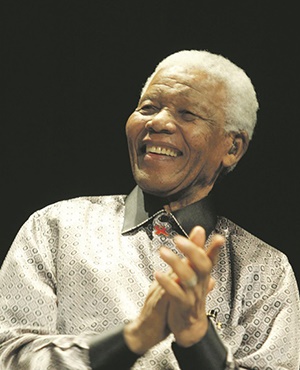We must be agents of change
2018-03-11 06:06The fight against all forms of bondage is ultimately the condition of free self-definition, nationhood and prosperity. “Free slaves” is a contradiction in terms. Sadly, this absurdity seems to be what we want to accept and perpetuate.
Let me explain.
The pursuit of justice, transformation and reconciliation in post-apartheid South Africa continues to be arduous and prickly.
This impacts profoundly on how we interact, exchange goods and services, and generally organise our lives.
Individuals respond to change differently and how we perceive change often determines how we react to it and each other.
Affirmative action at workplaces; free movement, expression and association; and the quest for economic inclusivity and reconciliation all require relentless advocacy and constant reassurance.
Former president Nelson Mandela succeeded in steering political change largely due to his unwavering commitment, reassuring and unimpeachable character, and an aversion to vengeance against his former oppressors and captors.
What seems to be missing though, is adequate and sustained forewarning by our leaders, both political and religious, of the sacrifices our changing society demands.
Public discourse on nation building and reconciliation diminished with the departure of Mandela, journalist Aggrey Klaaste and Archibishop Desmond Tutu from active life.
Rising incidents of racial attacks and provocation have since overshadowed the pursuit of nationhood, and are worrisome.
Race relations during apartheid were regulated by restrictive laws. The effects thereof still influence how we interact across racial lines.
Repealing apartheid laws and proclaiming “rainbowism” did not, ipso facto, assure enduring racial harmony. Racial mistrust and tensions abound.
When inter-racial interactions do occur, it is generally the expectation that blacks blindly assimilate other races’ norms of good behaviour and practice, in order to gain validation and acceptance.
The complex and rapidly changing nature of our society presents idiosyncrasies which, if left unchecked, could hamper nation building.
Black working parents with familial commitments, such as attending their child’s township school’s annual general meeting or parent-teacher engagement, are often unable to effectively partake in, never mind contribute meaningfully to, society.
Thoughtfulness and changes in employers’ attitudes to such idiosyncrasies could help improve relationships, and contribute to nation building.
Affirmation of political and social change counts for naught as long as the material, economic conditions of blacks remain largely unchanged.
Even though blacks constitute the largest consumer market for goods and services, we remain rooted in the peripheries of meaningful economic participation.
Perversion of vested authority to drive economic change, particularly by blacks ourselves, is prevalent and disheartening.
On the one hand, some white folks bemoan the demise of their apartheid-era entitlements. This is despite the fact that income and wealth disparities still largely reflect apartheid-era patterns.
Enslaved by the past and unwilling to unclench their fists, these folks resent interventions intended to redress, as President Cyril Ramaphosa articulated it in his maiden state of the nation address, “the injustices of the past and the inequalities of the present”.
On the other hand, incipient hubris by the ruling elite risks rendering the state, and blacks in general, impervious to the plight and reasonable concerns of whites.
Moreover, emerging social constructs encourage us to segregate into entirely different realities where not just race, but economic status and assimilation, influence the nature of our interactions, and attitudes towards the pursuit of justice, change and reconciliation.
This invariably feeds into a crucible of resentment that provides fertile conditions for a combustible mix of emotions to flare up.
Chief Justice Mogoeng Mogoeng remarked in a recent interview that South Africa faces a race war if we don’t unite and reconcile.
Although Mogoeng was uncharacteristically alarmist, it would be imprudent to dismiss his concerns as misplaced.
Restless individuals and fringe groups, often buttressed by race-based organisations, do exist and advance parochial interests.
These characters often stir racial discord using legitimate concerns, including strife afflicting farming communities or the plight of the downtrodden.
In order to attain unity and enduring reconciliation, perhaps we need to earnestly interrogate the essence of our individual freedoms and being.
Apropos, we need to ask of ourselves: What is the essence of my freedom if women cannot walk, never mind engage, freely in public spaces without fear of attack by men?
What is the essence of my being when my compatriots cannot participate equitably in the mainstream economy for reasons other than their abilities?
What is the essence of my freedom if instruments intended to redress the inequities of the past, including rising wealth and income inequalities, are perverted to advance selfish interests?
What is the essence of my being when vulnerable and less fortunate people are subjected to the worst form of human treatment, often by those entrusted with their care?
What is the essence of my freedom if I bear silent witness to wrongdoing by big business, including anti-monopolistic behaviour and state capture, which ultimately hurts poor and vulnerable members of society the most?
What is the essence of my being when I become impervious to intolerance, hatred or the perpetuation of bigotry?
And lastly, what is the essence of my freedom and being when I remain indifferent to attacks on farmers and vulnerable farm workers?
If we can grapple with these posers, perhaps we shall be able to amply respond to the prevalence of antisocial behaviour, such as the kicking of a black woman protester outside ANC headquarters by a black man, and the vicious assault of a black athlete in Potchefstroom by despicable marauding white.
Perhaps we could stop a recurrence of the callousness with which Gauteng health department officials and politicians treated (no pun intended!) Life Esidimeni mental health patients. This includes conduct such as that of the most senior black executive at Massmart who, in apparent collusion with a minister and others, tacitly aided and abetted the perversion of pro-competition instruments intended to advance black small business’ interests.
Evidently, some among us, irrespective of colour, are the antithesis to others’ wellbeing, aspirations and advancement.
We proclaim to be free and caring, but invariably perpetuate the injustices and divisions of the past.
Mogoeng remarked further: “South Africans seemed to think that things would automatically work themselves out, but the divisions of the past need a ‘deliberate and thoroughgoing programme’ which would ‘require a very mature, calm and wise leadership’.”
Redressing the “divisions of the past” demands mobilising resources towards change and reconciliation programmes. The centrality of civil society, particularly faith-based organisations, in driving this can never be overemphasised.
Let it not be that the only time we engage in discourse on race, reconciliation and transformation is when we, predictably, tear at each other.
As Mandela’s 100th birthday anniversary advances, perhaps the greatest gift we could grant him, posthumously, is a recommitment and dedication to pursuing reconciliation. For the sake of our forebears and future generations, we each have a responsibility to advance our nationhood.
Whether we succeed or fail, endure or wilt, will depend on what each one of us does as an agent of change and reconciliation.
- Khaas is chairman of Corporate SA, a strategic advisory & consultancy firm. Follow him on Twitter @tebogokhaas
TALK TO US
How do we achieve social cohesion and reconciliation?
SMS us on 35697 using the keyword CHANGE and tell us what you think. Please include your name and province. SMSes cost R1.50





 Loading comments...
Loading comments...























